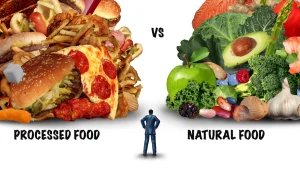
Organic foods are often considered better than processed foods for several reasons, which encompass nutritional value, health benefits, environmental impact, and ethical considerations. Let’s break this down in detail:
1. Nutritional Benefits
Organic foods are generally grown without the use of synthetic pesticides, herbicides, and fertilizers. As a result, they tend to retain higher levels of nutrients and antioxidants. Studies have shown that organic produce can have up to 20-50% more antioxidants compared to conventionally grown foods. These antioxidants play a crucial role in preventing chronic diseases, such as heart disease and cancer.
Processed foods, on the other hand, often lose a significant amount of their nutritional content during manufacturing. For example, the refining process used to make white flour strips away fiber, vitamins, and minerals. Additionally, many processed foods are high in unhealthy fats, added sugars, and artificial additives, which can contribute to weight gain, diabetes, and other health issues.
2. Health Benefits
Organic farming avoids the use of synthetic chemicals, growth hormones, and antibiotics. Consuming organic food reduces the risk of exposure to these harmful substances. For example, pesticide residues in conventional foods have been linked to hormonal disruptions and developmental issues, particularly in children.
Processed foods, by contrast, often contain trans fats, excessive sodium, and artificial preservatives. These ingredients can lead to long-term health problems such as hypertension, high cholesterol, and cardiovascular diseases. Furthermore, additives like artificial dyes and sweeteners have been associated with behavioral issues in children and allergic reactions in sensitive individuals.
3. Environmental Sustainability
Organic farming practices are designed to work in harmony with nature. They focus on soil health, water conservation, and biodiversity. By avoiding synthetic chemicals, organic farming helps maintain the ecological balance and reduces water pollution. Additionally, many organic farms prioritize sustainable practices like crop rotation and composting, which improve soil fertility and reduce greenhouse gas emissions.
Processed foods often come from industrial farming systems that rely heavily on chemical inputs and monoculture practices, which deplete soil nutrients and harm wildlife. The manufacturing and packaging processes for processed foods also consume significant energy and resources, contributing to environmental degradation.
4. Taste and Quality
Many people find that organic foods taste better than their conventional counterparts. This could be due to the absence of synthetic chemicals, which can alter the natural flavor of fruits and vegetables. Organic produce is also typically fresher since it is often sold locally and not transported over long distances.
Processed foods are engineered for long shelf life and convenience, often at the expense of taste and quality. Flavor enhancers and artificial additives are used to make processed foods more palatable, but they can’t replicate the natural, fresh taste of organic products.
5. Ethical and Social Considerations
Organic farming often emphasizes fair labor practices and animal welfare. Organic livestock is raised in more humane conditions, with access to outdoor spaces and a natural diet. This ethical approach resonates with consumers who value the humane treatment of animals and fair wages for farmworkers.
Processed foods, on the other hand, are frequently tied to exploitative labor practices and factory farming. Factory farms prioritize efficiency over animal welfare, leading to overcrowded and inhumane conditions for livestock. Additionally, the heavy marketing of processed foods can contribute to unhealthy dietary patterns, particularly among low-income populations.
6. Lower Risk of Chronic Diseases
Long-term consumption of organic foods has been linked to a lower risk of chronic illnesses, such as cancer and heart disease. A study published in JAMA Internal Medicine found that people who frequently consume organic foods have a reduced risk of developing certain types of cancer, likely due to lower pesticide exposure.
Processed foods, laden with high levels of sugar, unhealthy fats, and sodium, are significant contributors to the global rise in obesity, diabetes, and heart diseases. These foods are often designed to be addictive, leading to overconsumption and poor health outcomes.
Conclusion
While organic foods tend to be more expensive, their benefits in terms of nutrition, health, and environmental sustainability make them a worthwhile investment for many people. In contrast, the convenience and affordability of processed foods often come with hidden costs to personal health and the planet. Making the shift towards organic and minimally processed foods is a step toward a healthier lifestyle and a more sustainable future.



 DailyMediCure
DailyMediCure 













